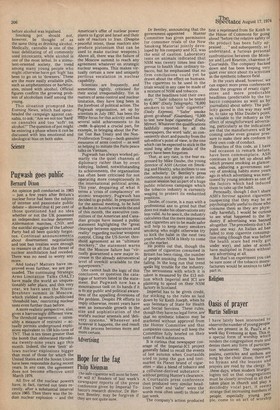Religion
Oasis of prayer
Martin Sullivan
I have lately been interested to observe the number of young people who are present in St. Paul's' at a week day Evensong at 4pm. This is a special form of worship winch renders the congregation mute and denies them any form of participation whatsoever. The responses, psalms, canticles and anthem are sung by the choir alone; there are no hymns and the lessons and prayers are read by the clergy. In .these days, when modern liturgiologists tell us that congregations must be closely involved in all that takes place in church and play a decidedly vocal part, it seems strange that increasing numbers of people, especially young peopie, come to an act of worship
Which seems to ignore these particular emphases. From what I have been able to discover it appears that this type of service provides those who attend it with an oppor tunity for reflection and medita tion. Forty minutes occasionally in an oasis which offers refreshment and peace to the spirit, is almost a necessity in a world of tension and unrest. More and more men and women who work in the square mile of the City of London find that the presence of thirty-seven churches in this concrete jungle affords them with opportunities to 'come apart and rest awhile.' Some Pray; some don't; all of them believe in a fashion. A short period of reflection can often awake beliefs Which have been lying gently asleep in some dormitory of our minds. The reason they slumber on IS simply that we never think about them. Even a moment's reflection can stir them.
Many of us are puzzled and perhaps frustrated by our failure to Pray as we should. We may think that constant petition is unworthy and we would prefer to commune rather than ask. To make a determined effort from time to time to recollect, triggers off a process Which steers our minds towards things%bich 'are noble and of good report.' For such an enterprise we are helped by the right physical surroundings. Few of us in crowded and noisy conditions can enter our chambers and be still, and so a quiet church or chapel will provide us With such a corner. It is vital that, as we care for our bodies, provide for our leisure, cultivate our brains and devote ourselves to our work, we Should attend to our spirits.There is no need for long prayers or meditations. Words can be dispensed With as we think of why we have been sent into this world and what Purpose our lives are serving. If we turn to Christian teaching we are reminded that the indwelling presence of the Holy Spirit is with us all. Perhaps we can believe that it is true as we consider the promptings for sacrificial effort which have moved us, the determination at all costs to keep our integrity, the good desires which mysteriously enter our minds and seem to possess them, and the conviction that our ideals and deepest yearnings are not wholly illusory.
Paul Tillich has argued that, humanly speaking, prayer is impossible. It is God Himself who intercedes and bridges the gap between us and Him. Such a symbol taken literally is absurd, but it spells out a Profound truth it it is regarded as a rgendine symbol. Take the passage from St Paul. "Likewise the Spirit helps us in our weakness: for we do not know how to pray as we ought,
but the Spirit himself intercedes for Us with sighs too deep for words.,
And He who searches the hearts of Ten knows what is in the mind of ;ue SPirit" (Romans VIII vv 26, 27.
lt is these 'sighs' which express as Much as we can utter. Too deep for Words they are the expression of °Ur inmost being. They are also the Work of God within us, activating and motivating us as we meditate and contemplate.
,Martin Sullivan is Dean of St mul's



































 Previous page
Previous page